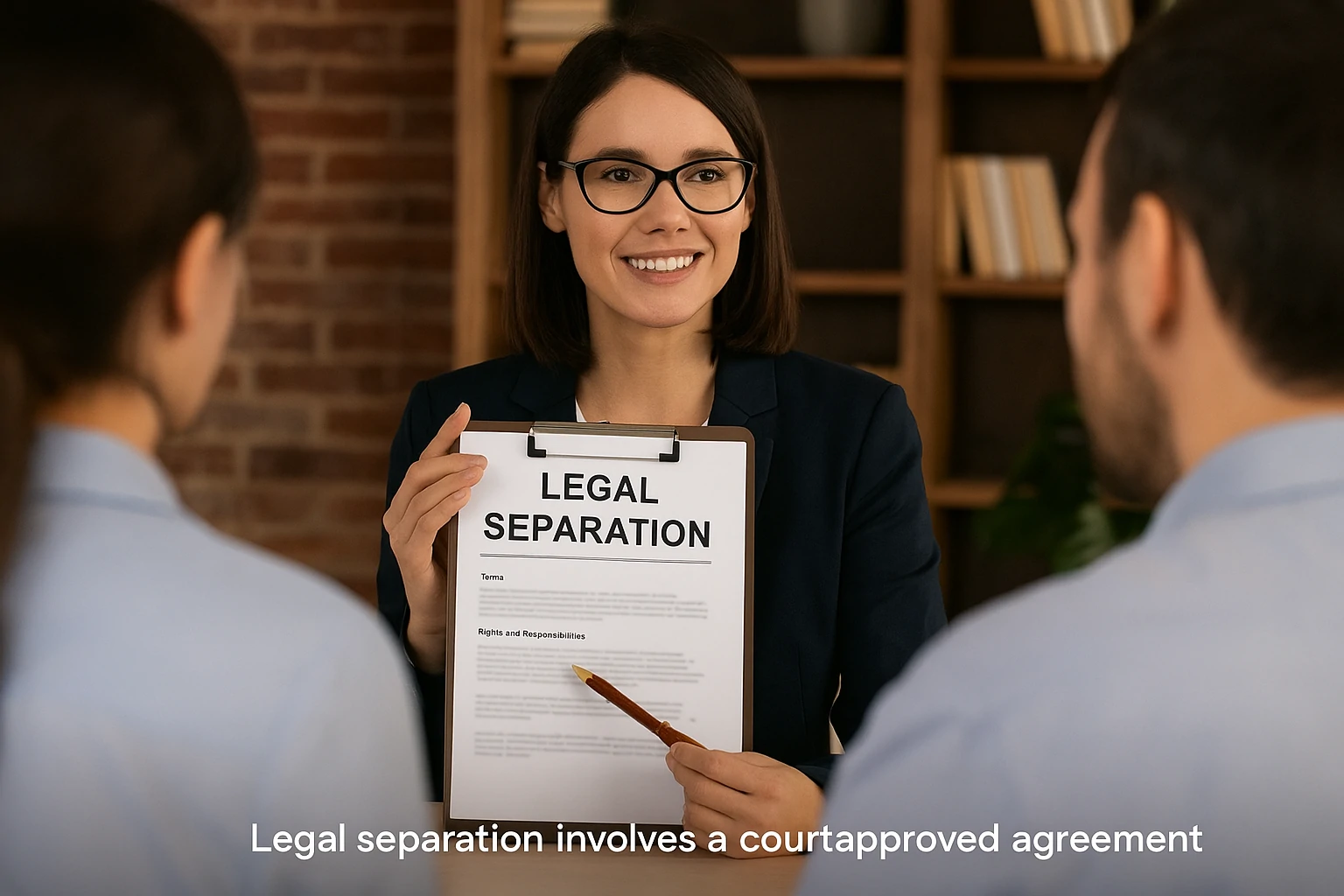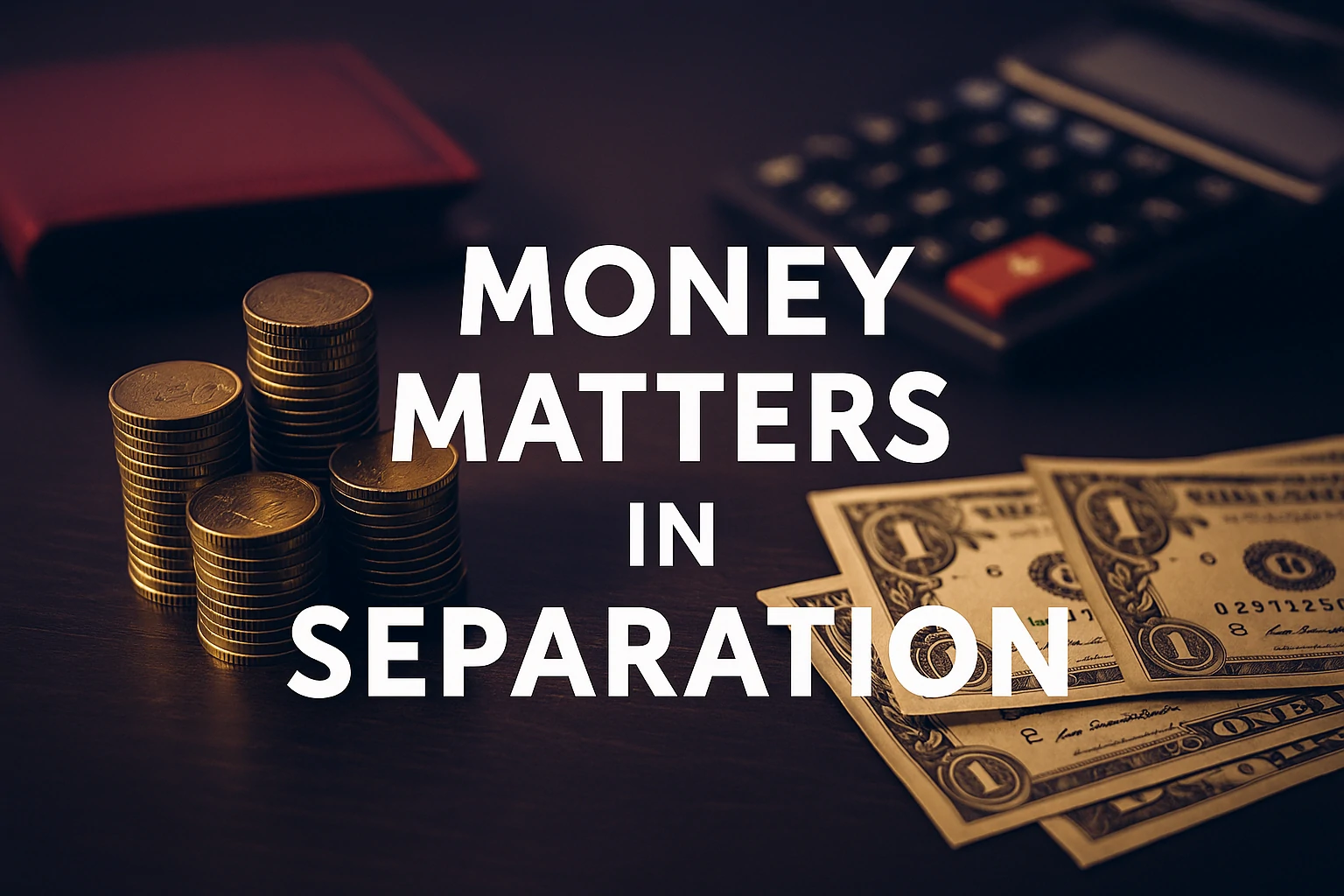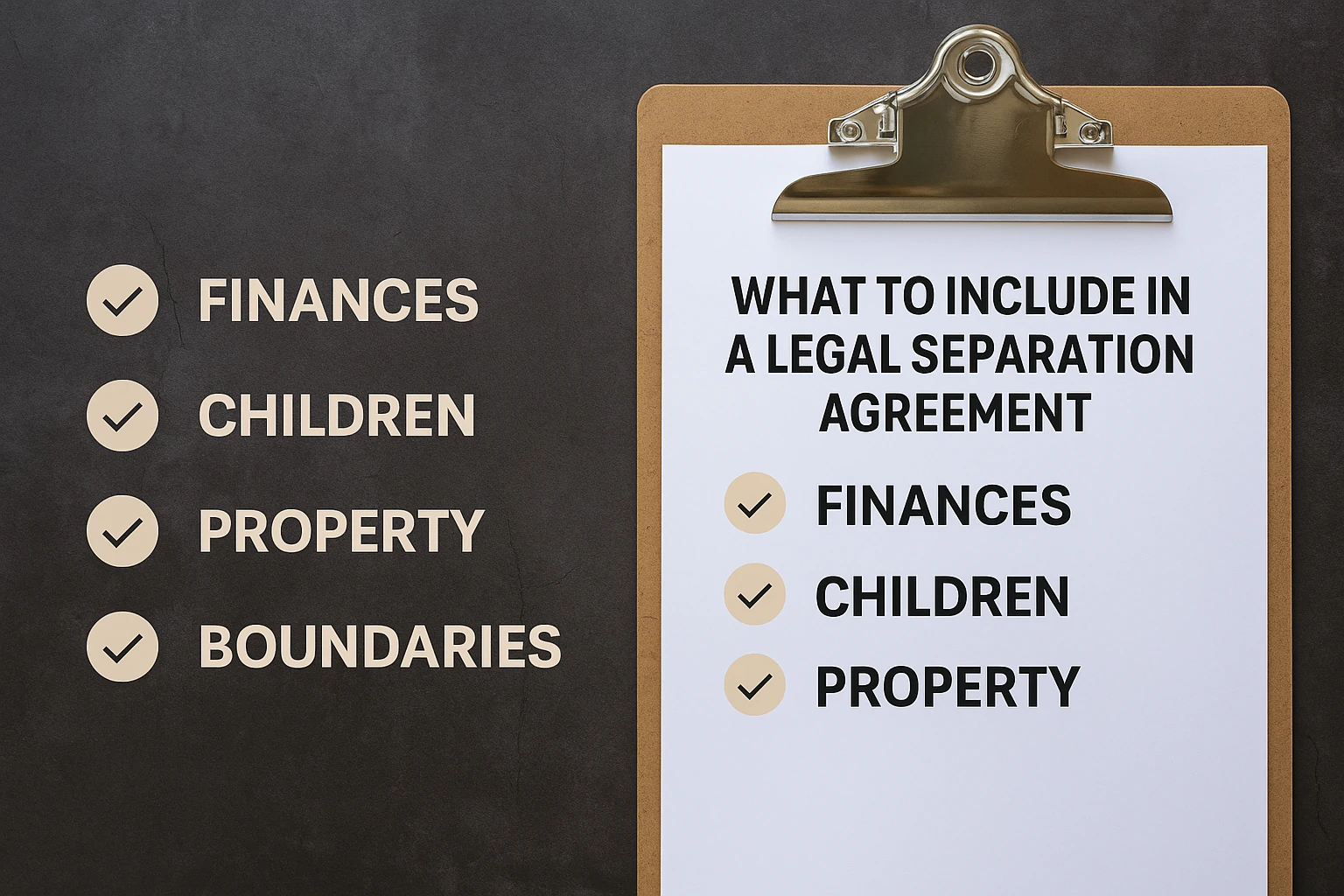Life does not always move in a straight line. Couples grow, change, and sometimes drift apart. These changes can lead to tough choices. One partner may leave the home. Another may ask for time and space. During these moments, words like “separated” and “legally separated” come up. At first, they may sound the same, but they carry different legal meaning. This difference can change your rights, money, and future.
People often think living apart from their spouse means they are already in a legal process. That is not always true. A couple can live apart for months or even years and still be legally married. Some take legal steps to create structure and protect their interests. Others avoid legal action but find themselves unprotected later. Understanding both paths helps you make the right decision.
This article breaks down what each status means. It shows how separation can affect your home, your children, your debts, and your benefits. It explains why some couples choose legal steps and others do not. It also helps you think clearly if you face this moment in your life. Knowing the facts gives you strength. It protects your future and your peace of mind.
Understanding Separation: What It Really Means
A couple is separated when they no longer live like husband and wife. They may live in different homes. Some remain under one roof but sleep in separate rooms. They cook meals alone, split bills, and go their own ways. In most cases, this is a private choice. You do not need court approval to live this way. It can start with one person moving out or a clear agreement to live apart.
Separation does not end the marriage. You are still legally tied to your spouse. You cannot remarry. You may still owe or receive support. Property and debt may still be shared. If one of you passes away without a will, the other may inherit. These facts often surprise people who assume separation ends everything.
Some couples separate for personal reasons. They may hope to fix the marriage in time. Others need distance to think more clearly. Many do not want court involvement yet. But even without court orders, their actions can affect children, finances, and legal rights. Problems often grow when nothing is written down or enforced. That is why many people later regret staying informally separated.
Legal or Trial Separation? Know the Difference
Some couples choose a trial separation first. They live apart to take a break and think about their next step. This is often an emotional decision, not a legal one. It gives them space without court orders or legal paperwork.
A trial separation may feel easier in the short term. But it offers no legal protection. If one person breaks a promise or makes a big decision, there is no official plan to stop it. No one is required to follow any rules. That can cause stress or damage if things go wrong.
Legal separation is different. It involves the court. A judge creates a legal plan that both sides must follow. That includes how to manage money, where the children live, and who uses the home. This setup offers stability, clarity, and legal support.
The main difference is enforcement. A trial separation relies on trust. A legal separation relies on the law. If you need protection or a clear agreement, a trial separation may not be enough. Understanding both options helps you make the right move for your life.
What Legal Separation Really Means

Legal separation is more than just living apart. It is a court-approved status. A couple goes before a judge. They ask for a ruling that creates legal rules while keeping the marriage intact. You remain married, but the law steps in to create clear boundaries. Each person knows their role, their rights, and their limits.
To get a legal separation, you must file paperwork. You give the court basic facts about your marriage, your home, your money, and your children. A hearing follows, where the judge reviews everything. Once approved, the court sets rules about who lives where, who pays what, and how children are raised. These rules are official and must be followed.
People choose legal separation for different reasons. Some have religious beliefs that make divorce hard. Others want to keep tax or insurance benefits that would end with divorce. Some use legal separation as a step before divorce to ease into the change. Whatever the reason, this legal step offers protection. It helps people stay safe, clear, and supported as they move forward.
How Do States Differ in Separation Laws?
Separation laws are not the same in every state. Some states offer clear legal separation processes. Others do not allow legal separation at all. This means your options depend on where you live.
In states like California, you can file for legal separation just like you would for divorce. The court will issue orders on support, custody, and property. You remain married, but your rights and duties are clearly set.
In Texas, legal separation is not available. Couples must file for divorce or create private agreements. These agreements are not court orders and may not protect you the same way. If you live in Texas, you must take extra care when separating.
Some states have waiting periods or residency rules. Others limit what a court can decide during separation. You may need to live apart for a set time before filing. Always check your state’s rules before you act.
Knowing your state law helps you choose the right path. It also helps you avoid mistakes that may affect your money, your family, or your legal rights.
When laws about minors or consent become relevant, you can also view the guide on the Indiana age of consent law to understand rights and restrictions by state.
How the Two Are Different
The biggest difference is the role of the court. A regular separation is personal and private. Legal separation involves the law. That brings formal rules, enforcement, and legal protection. If one person does not follow the agreement, the court can step in.
In a private separation, both people must agree and cooperate. There is no legal backup if things fall apart. In a legal separation, a judge says who pays bills, who stays in the house, and who cares for the kids. This removes confusion. It gives each person the power to act if problems arise later.
Legal separation also gives you proof. The court issues papers that show your status. These can be used with landlords, banks, tax agencies, and schools. A private separation does not offer the same support. You may struggle to prove what your arrangement is or what your rights are.
If you face a spouse who refuses to follow promises, legal separation gives you a path to enforce the rules. You can go back to court. You can request help. That makes legal separation a smart step for those who want peace of mind.
Money Matters in Separation

Money becomes a major concern when couples live apart. Without a legal plan, both people may still be responsible for shared debt. If your spouse uses a joint credit card, you may still be liable. This can hurt your credit and add stress.
Legal separation helps fix that. The judge can freeze shared accounts. They can assign who pays each bill. They may even order spousal support. These steps prevent damage and keep both sides stable. They also stop surprises like overdrafts or debt collections.
Many people overlook car loans, home payments, or credit lines. These often remain shared unless a court says otherwise. A legal plan protects your name. It gives you a way to control spending, payments, and risk.
Without legal steps, all these issues stay tied together. One mistake or missed payment can affect both people. Legal separation sets clear rules. It keeps your finances clean and safe during a hard time.
How Does Separation Affect Retirement Accounts and Pensions?
Retirement accounts often hold the most value in a marriage. When couples separate, they may not think about these accounts right away. But ignoring them can cause problems later. Rules differ between simple separation and legal separation.
If you separate without court action, your spouse may still have access to your retirement. That includes 401(k)s, IRAs, or pension benefits. If something happens to you, your spouse may still be the legal beneficiary. That could leave other family members with nothing.
Legal separation gives you the power to protect your future. The court can decide how retirement accounts will be handled. A judge may freeze withdrawals or split the account value. This creates fairness and avoids confusion when the marriage ends later.
Some accounts have rules that only allow changes with court approval. That makes legal separation even more helpful. You should also check your named beneficiaries. Make updates if needed. That ensures your savings go to the right person.
What Happens with the Children
When children are involved, the stakes rise. In a regular separation, there is no legal custody plan. Either parent can make choices. Either parent can take the child. This opens the door to fights, stress, and possible harm.
Legal separation removes this danger. The court creates a custody order. It sets where the child lives. It names who can make medical and school decisions. It lays out visit times. It protects the child’s routine and mental health.
Children do better with structure. They need to know where they will sleep, who will pick them up, and what rules apply. Legal separation gives that structure. It also gives both parents a fair say. Neither one can control the situation alone.
Without legal custody orders, you risk losing time with your child. You also risk misunderstandings that hurt everyone. Legal separation keeps the child’s needs front and center. It avoids chaos. It builds peace for both parents and children.
What About the Home and Property

Separation also brings questions about the home, cars, and shared things. In a regular separation, everything may still be jointly owned. If you move out, your spouse may change the locks. If they sell or damage property, you may lose out.
Legal separation puts these issues in writing. The judge decides who stays in the house. They say who keeps which car. They may stop either person from selling or changing property without agreement. That protects both people from unfair loss.
If you rent, legal separation also helps. The court can assign the lease to one person. This avoids confusion with landlords. It also protects your name from damage claims or eviction.
People often skip these steps in a regular separation. But they regret it later. Legal orders give you power and fairness. They make sure both sides know what belongs to whom and what must stay in place.
Health Insurance and Medical Coverage
Health insurance is a major reason people choose legal separation. Many employer plans allow spouses to stay covered under legal separation. That changes once you divorce. Some plans stop coverage the day the divorce is final.
Legal separation gives you a way to live apart but stay insured. It helps if one spouse cannot afford a plan alone. It also helps cover children. You must check the rules of your health provider to see what they allow.
Courts can also split medical bills. If one child has care needs, the judge may order both parents to pay. This keeps the child covered and avoids fights over payments. Without legal separation, one person may end up with all the bills.
You cannot rely on good faith alone. Legal protection gives both sides peace. It helps avoid denied claims and canceled coverage.
How Separation Affects Life Insurance, Wills, and Inheritance
When couples separate, they often forget to update their life insurance or estate plans. That can create problems later. Even if you no longer live together, your spouse may still receive your money when you die—unless you make clear legal changes.
In a simple separation, your spouse stays your legal beneficiary unless you update your policy. That means if you pass away, they may get your life insurance, pension, or retirement funds. This is true even if you live apart for years.
Legal separation helps clear this up. You can ask the court to set terms for life insurance. A judge may require both people to keep coverage for the other, especially if kids are involved. You should also update your will. Make sure it shows your true wishes.
If you want your money or property to go to someone else, change your documents. Update your insurance forms, retirement accounts, and legal papers. A simple update now can stop big problems later. Separation changes your life. Your plans should change too.
Tax Filing and Legal Proof

Taxes get complicated during separation. If you stay married but live apart, you may still file jointly. Or you may file as married but separate. Some people may qualify as head of household. The right choice depends on the facts of your life.
Legal separation gives you the proof you need. It shows where you lived. It shows who cared for the kids. That helps with IRS rules and protects you in an audit. It also helps avoid trouble with refund checks or tax credits.
Without legal documents, the IRS may reject your filing status. That leads to penalties or lost money. A clear court order helps you file the right way and keep your records safe.
When Legal Separation Makes the Most Sense
Legal separation is not just for couples heading toward divorce. It helps in many cases. If you have kids, shared debt, or a home, court orders offer safety. They create clear rules and lower the chance of future fights.
Some people need time before divorce. Others want to stay married for benefits, religion, or family reasons. Legal separation supports that. It creates space but keeps structure. It helps people adjust without cutting all ties.
Private separation only works when both sides are fair and honest. If trust is broken, you have no legal help. That puts your money, time, and future at risk. Legal separation removes that risk. It gives you a roadmap.
You can also reach out to local help centers. The Daly City Legal Advocacy Center offers support to people who face tough legal choices during separation.
Religious and Cultural Views on Separation vs. Divorce
Some people avoid divorce because of their faith or family traditions. In many cultures and religions, marriage is a lifelong bond. Ending it through divorce can carry shame or guilt. Others may believe that divorce is not allowed at all.
Legal separation offers an option that respects these beliefs. You stay married in name and in law, but live apart with clear rules. This helps people honor their values while protecting their well-being. You get the safety of a legal plan without breaking your marriage vows.
Cultural pressure can also affect decisions. Some families may push couples to stay together no matter what. Legal separation offers a private way to create space. It lets couples avoid full divorce but still move forward with peace and safety.
Whether due to faith, family, or tradition, legal separation may be the answer for those who need legal clarity but do not want to fully end the marriage. It offers a path that protects both personal values and practical needs.
Can You Stay Legally Separated Forever?

Some couples remain legally separated for years. They never divorce. They follow the court order and live apart. That is legal in most places. But you must know the limits.
You cannot marry again. You still share some legal ties. You may still owe support. Your spouse may inherit from you unless you change your will. All this matters if you want full freedom one day.
Some people find peace in this space. Others later choose divorce. Either path can work if you stay informed. But you must understand the law and update your plans as life changes.
What Happens If You Reconcile After Separation?
Many couples who separate later find their way back together. Time apart can heal old wounds and bring a new start. If that happens, you need to handle the legal and financial side carefully.
If you are only privately separated, there is nothing formal to undo. You can move back in and continue life together. You should still update your bank accounts, insurance, and household records to reflect your new situation. This helps avoid confusion with taxes and benefits.
If you are legally separated, things are more detailed. You must ask the court to cancel the separation order. A simple form or motion can do this. Once the judge approves, your legal status returns to “married.” This restores your joint rights, such as property ownership and benefits.
Reconciliation can bring joy but also legal tasks. You may need to review past agreements, update wills, and reset joint accounts. Always keep records in writing. That helps if you ever face future disputes. Taking the right steps protects your family and your finances.
Should You Get a Separation Agreement Without Going to Court?
Some couples want to separate but avoid the courtroom. They may still want a clear plan, so they create a private agreement. This type of deal may explain who pays bills, who stays in the home, and how parenting is handled. It can bring peace if both sides agree and stick to it.
This kind of agreement may work well for short-term issues. It costs less and feels less formal. But it does not carry the same legal strength as a court order. If one person breaks the deal, the other may not have a way to enforce it.
Courts do not always accept private deals. They might ignore them during a legal case. That means you may still end up in court if problems grow. Even if you trust the other person now, things can change.
To make a private agreement safer, you should write it clearly and have it signed and notarized. Some people ask a lawyer to review it. That gives it more weight later if you need help. A private agreement is not the same as legal separation, but it can be a helpful step if done right.
How to Start the Process
If you want legal separation, check your state laws. Not all states allow it. Some treat it the same as divorce. Others have special rules. If it is allowed, you file papers in court. You explain your living situation, property, and children.
You must also serve your spouse with the forms. The court may call for a hearing. A judge then approves a legal plan. That plan becomes law. Both sides must follow it. If anyone breaks the rules, the court can step in.
Some people hire lawyers. Others file alone. If your life is simple, you may not need legal help. But if kids or money are involved, a lawyer can keep you safe. They can help you avoid mistakes.
What to Include in a Legal Separation Agreement

A legal separation agreement works like a contract. It sets clear rules that both people must follow while living apart. A well-written agreement avoids confusion and protects your rights.
Here are the key parts you should include:
1. Finances
- Who pays rent or mortgage
- How to handle credit cards and debt
- Rules for joint bank accounts
- Any spousal support or shared costs
2. Children
- Where the children will live
- Visitation schedules and holidays
- Who makes school and medical decisions
- Child support amount and due dates
3. Property
- Who stays in the home
- Who keeps which car, furniture, or pet
- Rules for entering or using shared property
4. Boundaries
- Safety rules or no-contact terms
- Privacy limits and expectations
- Rules for overnight guests, if needed
Once both sides agree and sign, you can file the document with the court. If a judge approves it, the agreement becomes legally enforceable.
When to Hire a Family Lawyer for Separation
Not every separation needs a lawyer. If your situation is simple, you may handle the paperwork alone. But if you share children, property, or debt, legal help can protect your rights. A lawyer makes sure nothing is missed or misunderstood.
You should speak to a lawyer if you feel unsafe, or if your spouse controls money or access to the kids. A lawyer will explain your options and help you take action. If the other side already has a lawyer, you should have one too. This keeps things fair.
A lawyer also helps with paperwork. Court forms can be confusing. One mistake can delay the process or cause future problems. A lawyer helps you fill out the forms, meet deadlines, and follow court rules.
Legal advice costs money, but it can save you more in the long run. A good lawyer helps you make smart choices and avoid mistakes. Even one meeting with a lawyer can give you clarity and peace of mind.
Some people confuse separation laws with age-based consent rules. If your case involves teens or questions about legal age, read this full guide on the legal age of consent in Illinois.
Does Separation Impact Immigration or Green Card Status?
Separation can cause real problems for couples dealing with immigration. If one spouse has a green card or visa based on marriage, living apart may raise questions. U.S. immigration laws expect the couple to live together in good faith. A long separation can lead to delays, extra paperwork, or even denial of future status.
If you are in a simple separation without court documents, immigration officers may see that as a red flag. They may ask for proof that your marriage is still real. If you cannot show shared bills, joint housing, or active contact, your status may be at risk.
Legal separation may help explain your situation. It shows that the marriage is still active, even if you live apart. You can also submit statements and court orders to prove your case. But you must be honest. Do not hide facts or submit false documents.
Always speak to an immigration lawyer if your status depends on marriage. A simple choice to live apart can bring major consequences. Getting the right advice early protects your path to stay in the country legally.
Final Thoughts
Separation is more than just time apart. It changes how you live, how you parent, and how you plan your future. Some people choose it to save a marriage. Others use it as a clear step before divorce. No matter the reason, you must know your rights and protect your interests.
Legal separation can offer peace, space, and legal structure. It gives you room to think and plan without rushing into a divorce. But it also carries weight. You may need court papers, agreements, and real decisions about money, kids, and property. This is not a casual break. It is a legal move with real effects.
If you feel unsure, take time to learn. Talk to a family law attorney. Ask questions. Look at your long-term goals. A clear path now can help you avoid problems later. Whether you stay separated, get back together, or move toward divorce, you deserve support and clarity. Make every step count.
🎯 Bonus Tip: Think Ahead, Not Just Now
Legal separation is not just about space. It’s about structure. Make smart choices today that protect your future. Update your legal papers. Set clear terms. Talk to a family law attorney if you feel unsure. Whether you stay apart or come back together, your choices now will shape what happens next.
This article provides general legal information for educational use only. It does not offer legal advice. Always consult a licensed attorney in your state.




